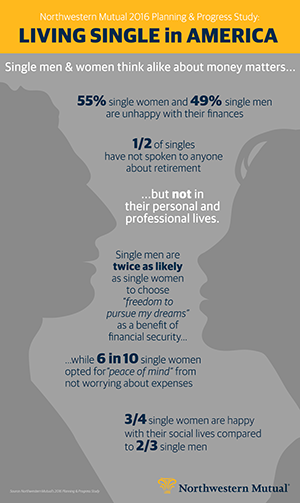
Planning & Progress Study 2016
This is proprietary research conducted by Northwestern Mutual in 2015. Use of this information is intended for reference. Northwestern Mutual's recent proprietary research is available here.
The 2016 Planning and Progress Study seeks to provide unique insights into U.S. adults’ attitudes and behaviors towards money, financial decision making, and the broader landscape issues impacting people’s long-term financial security.
The study was based on an online study of 2,646 U.S. adults conducted from February 1-10, 2016 (2,026 interviews with U.S. adults age 18+ in the General Population and an oversample of 620 interviews with U.S. Millennials age 18-34) Data were weighted to be representative of the U.S. population (age 18+) based on Census targets for education, age/gender, race/ethnicity, region and household income.
Single men and women have distinctly different lifestyle perspectives from their married* counterparts, as well as from each other. Specifically, while singles of both genders share a similarly high level of anxiety about their finances compared to married people, they diverge in outlook on personal lives and careers.
Financial concerns
Overall, single men and women are generally less satisfied with their financial circumstances than married Americans:
- More than half of single women (55%) and nearly half of single men (49%) are unhappy with their financial situations compared to one third of married women and even fewer married men
- Singles are nearly twice as likely as married people to feel “not at all” financially secure” (38% of single men and women combined versus 23% of married men and women combined)
As a result, financial anxiety runs high among singles. More than four in 10 (45%) of single men and half (50%) of single women say they feel either a moderate or a lot of anxiety about their personal financial security – a substantially higher percentage than married individuals (35% married men and 41% married women).
This low level of financial confidence may be a function of gaps in planning:
- Two in three singles are not confident that their financial plan can withstand market cycles
- Half of all singles (49%) have not spoken to anyone about retirement – double the percentage for married individuals (24%)
- Two thirds of singles do not have a financial advisor
Not a single voice
Despite shared financial concerns, single men and women have little in common when it comes to other aspects of their lives. Single men appear to be more focused on professional success, opting for “satisfying career” as an attribute of the American Dream more frequently than single women and married people. Moreover, single men were twice as likely as single women to choose “freedom to pursue my dreams” as the top benefit of financial security.
For single women, on the other hand, the most pressing priority appears to be relief from financial obligations, with six in 10 (compared to 46% of single men) choosing peace of mind from not worrying about day-to-day expenses as the leading benefit of financial security.
Notably, despite the financial pressure, single women are generally more positive about various aspects of their lives. Three quarters of single women (74%) are happy with their social lives compared to two thirds of single men (66%) and they also indicate a higher level of satisfaction with their family life and physical well-being.
Download the 2016 Planning and Progress Study – Living Single
* Married is defined as married/living with partner. All others are considered single.
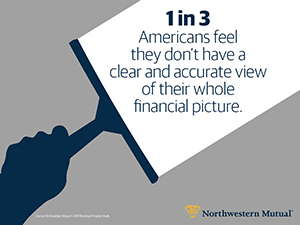
Americans are feeling financially vulnerable and it likely starts with the absence of a comprehensive perspective on their finances.
The findings revealed that one third of Americans (32%) do not feel they have a clear and accurate view of their whole financial picture, spanning both current obligations and future needs. This may be a factor as to why only one in five (20%) feel “very confident” that they will be able to achieve their financial goals.
Disconnect between words and deeds leaving Americans exposed
Most Americans are acutely aware of the importance of deliberate, sustained planning. When asked which they found more valuable, an overwhelming majority (89%) opted for “a feeling of comfort from knowing I am financially secure for the long-term” over “cash in hand today” while two in three acknowledged that their financial planning needs improvement.
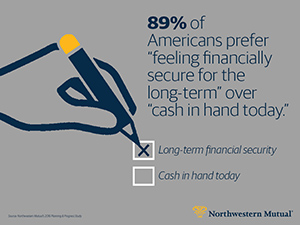
Despite their appreciation for the role that planning plays, people are not necessarily putting theory into practice:
- Only 40% are confident their financial plan can withstand market cycles, which is concerning considering that the majority (76%) increasingly expect there to be financial crises over time – (up from 67% in 2015)
- Fewer than 4 in 10 (37%) define a financial plan as a strategy to “…allow me to live comfortably when I get older or retire” with some saying it simply means sticking to a budget or living within one’s means
- 35% haven’t talked to anyone about retirement
Moreover, while six in 10 (60%) said that integrated solutions designed to both grow and protect their assets are most important to achieving financial security, only a small fraction of Americans own any financial products beyond a basic savings account:
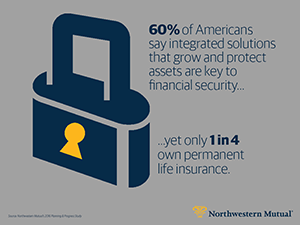
- Investments (including stocks, bonds, mutual funds, IRAs, ETFs) – 45%
- Permanent life insurance – 27%
- Term life insurance – 26%
- Annuity – 16%
Download the 2016 Planning and Progress Study — Assessing Financial Security
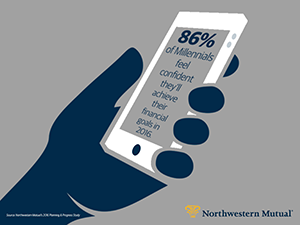
Millennials (ages 18-34) foresee a bright future for the nation’s economy as well as their own financial outlook
- Among the generations, Millennials are least likely to anticipate more financial crises in the future (66% vs 76% for Gen X and 80% for Boomers)
- A large majority of Millennials (86%) are confident that they will achieve their financial goals
- 4 in 10 (38%) believe the nation’s economy will improve in 2016 compared to fewer than a third of the general population and just a quarter of Americans ages 50+
Though generally positive about their long-term prospects, Millennials do have some concerns about retirement security with more than a third of them — double the general population — stating that it is “not at all likely” that the Social Security safety net will exist when they retire.
Strong Instincts
Millennials’ optimism about their financial future may stem from a commitment to financial planning that belies their years:
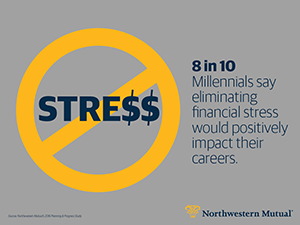
- More than half of Millennials (58%) consider themselves “highly disciplined” or “disciplined” financial planners
- Millennials are more likely than their Gen X and Boomer counterparts to recognize lack of planning as an impediment to financial security in retirement (40% vs 28% Gen X and Boomer, respectively)
- Though only 1 in 5 (21%) Millennials currently have an advisor, nearly three quarters (72%) are interested in receiving professional guidance compared to just 57% of the general population
Ambitious and Impatient
Despite taking the right steps for the long-term, Millennials are financially anxious in the present. In fact, 1 in 20 Millennials worry about money on an hourly basis. Their top cited sources of financial anxiety include day-to-day expenses (50%), unexpected expenses (45%) and student loan debt (34%).
Notably, finances strongly color how this ambitious generation — one that chose “satisfying career” as an attribute of the American Dream more than any other group — perceives its professional progress:
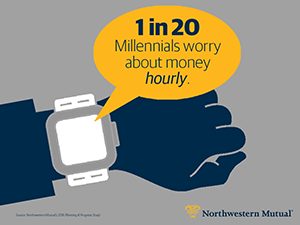
- 6 in 10 say that financial anxiety negatively impacts career (vs 41% general population)
- When asked how financial security would enable them to live life differently, Millennials were most likely to choose “pursue dream or passion” (39% vs 29% general population)
- 8 in 10 Millennials say that eliminating financial stress would positively impact their careers compared to two thirds of the general population
Download the 2016 Planning and Progress Study — Millennials: The Conflicted Generation
The established value of human advice in financial planning is not easily replaced by technology alone, according to the below findings of the 2016 Northwestern Mutual Planning and Progress Study.
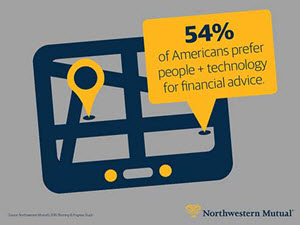
When asked how they would prefer to receive financial advice, the majority (54%) said the ideal solution combines a human relationship with technology while a full third (33%) prioritized a human relationship above all else. Notably, the appetite for a fully automated (robo) solution appears low across all age groups, even for Millennials, with fewer than two in 10 in that age group opting for robo.
Reservations about robo
Though 53% of Americans indicated that they would be open to trying automated advice, only a small fraction (7%) said they are “extremely or very interested” whereas as the majority cited only being “somewhat interested.”
The nearly 50% of respondents who had “no interest at all” in robo, flagged the following as their top reasons:
- A preference for a human advisor who can answer questions and discuss options (48%)
- Lack of trust (40%)
- Desire for knowledge and expertise of a human advisor (38%)
- Interestingly, this factor was most pronounced for Millennials, suggesting that even digital natives who rely heavily on technology in many aspects of their lives appreciate the importance of human expertise in navigating the intricacies of financial planning.
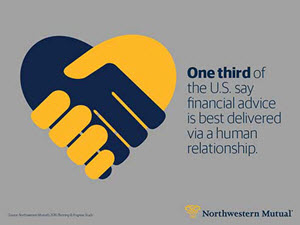
Women emerged as somewhat less receptive towards automated advice, with a full half saying they were “not at all interested” relative to 43% of men. This dovetails with other Planning & Progress Study findings indicating that women are more likely to prioritize deep knowledge of personal circumstances and tailored attention — intrinsic attributes of human advice — when describing the ideal financial services provider.
Download the 2015 Planning and Progress Study - People Plus Technology
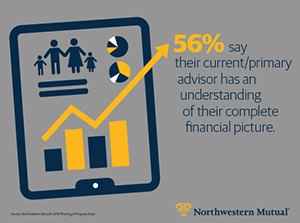
The majority (68%) of U.S. adults are not getting professional financial advice; and among those who are, many (43%) say their advisors don’t feel like long-term partners with a deep knowledge of their complete financial picture.
The study found:
- Nearly seven in ten Americans (68%) say that they do not have a trusted advisor who offers comprehensive lifetime financial planning.
- 45% of Americans do not know where to get the help they need as they move through life stages and need different financial solutions.
- Among those with a financial plan, 82% believe that their financial plan should be reviewed at least once every six months, and yet more than six out of ten people (62%) don’t have a financial advisor of any kind
Among those who are getting professional advice:
- Only 56% say their current/primary advisor gives them an understanding of their complete financial picture
- Only 43% say their current/primary advisor has a long-term commitment
- Only 41% say their current/primary advisor provides tailored attention
- A third (32%) works with multiple different advisors to address different parts of their financial lives (e.g., retirement planning, investments, insurance)
While those findings are concerning, it hasn’t diminished Americans’ long-term optimism. In an earlier finding of the study, Northwestern Mutual found that two-thirds (66%) of U.S. adults believe that they can attain ‘The American Dream’, and only 16% feel it is out of reach.
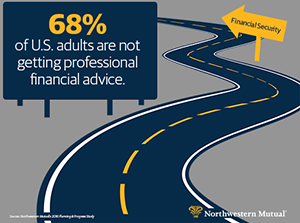
The research also found something of a values shift - more toward outcomes like happiness and security rather than some traditional notions of the American Dream such as material wealth, opportunities to advance and moving up in social class. When asked about the most defining characteristics of The American Dream today, the top two answers were:
- “Having a happy family life” (59%); and
- “Being financially secure” (58%)
Download the 2016 Planning and Progress Study — Closing the Gap
The United States is a nation of the financially anxious. The large majority of Americans (85%) report feeling financial anxiety today; and it’s getting worse: 36% say their anxiety has gone up in the last three years, versus only 14% who say it’s gone down. More than a quarter of Americans (28%) worry about their finances every day.
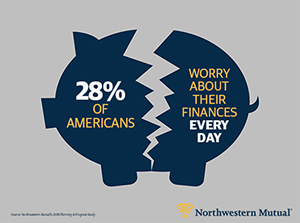
According to the 2016 Planning and Progress Study, the levels to which financial anxiety is impacting all corners of people’s lives is extraordinary. Among those feeling financial anxiety:
- 67% say it is negatively impacting their health
- 70% say it is negatively impacting their happiness
- 61% say it is negatively impacting their home life
- 70% say it is negatively impacting their moods
- 69% say it is negatively impacting their ability to pursue dreams/passions/interests
- 51% say it is negatively impacting their social life
- 41% say it is negatively impacting their career
Fear of the unknown
Interestingly, what seems to keep people up at night more than anything else is the unexpected. The top two financial fears, according to American adults are:
- Having an unplanned financial emergency (38%); and
- Having an unplanned medical expense due to an illness (34%)
This far outstripped fears such as losing a job (17%), having an extended period of unemployment (15%), and outliving retirement savings (21%).
When asked specifically where people’s financial anxiety is coming from, “Unexpected expenses” (55%) received the most mentions. This came well ahead of expected and generally planned-for major financial events such as saving for retirement (29%), healthcare costs (27%), mortgage/rent expenses (25%), credit card debt (25%), and student loan debt (13%).
The liberation that financial certainty would afford
While the negative impact that financial anxiety is having on people’s lives is substantial, the degree to which financial certainty would affect Americans currently experiencing financial anxiety in a positive way is equally extraordinary.
- 80% say it would positively impact their health
- 84% say it would positively impact their happiness
- 79% say it would positively impact their home life
- 81% say it would positively impact their moods
- 81% say it would positively impact their ability to pursue dreams/passions/interests
- 74% say it would positively impacting their social life
- 66% say it would positively impact their career
Digging into the specifics of those positive impacts, it’s clear that financial certainty would allow people to live their lives differently. Yet the changes might not be what you would immediately expect. There wouldn’t be many people quitting their jobs and buying fancy cars. When asked what the first two things people would do if they had the financial security to live their lives differently:
- Only 9% said they would change careers
- Only 12% said they would purchase luxury items like a boat, car or second home
- Only 15% said they would stop working altogether
- Only 29% said they would pursue a dream/passion
- Only 29% said they would work on their own personal health/well-being
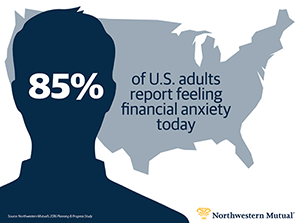
The first and second most popular responses were relocating/buying a home (34%) and leaving money to loved ones to help them feel financially secure (32%).
When asked for the single top benefit of financial security, the far and away first choice was “Peace of mind that I never have to worry about day-to-day expenses” (52%). This more than doubled the number of Americans who said the “Flexibility to live a desired lifestyle” (22%), and was more than six times greater than the 8% who said the “Freedom to pursue my dreams.”
Download the 2016 Planning and Progress Study — Financial Anxiety
As life expectancies continue to climb, Americans are increasingly less confident that their savings will last through retirement, according to findings from Northwestern Mutual’s 2016 Planning & Progress Study.

The study found that two thirds of Americans believe there is some chance that they will outlive their savings, with 1 in 3 (34%) saying the likelihood is 51% or better. Notably, 14% think that outliving their savings is a definite (100% likelihood).
However, Americans are not proactively addressing the financial implications of living longer. Only a fraction (21%) say they have increased their savings while more than 4 in 10 (44%) report having taken no steps at all.
The lack of preparation is particularly concerning given decreasing confidence about the future availability of Social Security:
- Only a quarter of Americans (24%) say it’s “extremely likely” that Social Security will be there when they retire
- 3 in 10 (28%) listed Social Security uncertainty among the greatest obstacles to achieving financial security in retirement
- Just one third of non-retired Americans (35%) expect that Social Security will be their sole or primary source of retirement income compared to nearly half of current retirees (49%)
Debt a pressure point
The findings further reveal that mounting debt is a serious source of financial pressure for Americans. When asked what one change would make the most significant impact on their financial situation, eliminating all debt (27%) narrowly outpaces earning significantly more income (26%), clearly indicating the magnitude of the debt issue. Mortgages emerge as the leading source of debt (29%), but the impact of credit cards come through strongly (23%), exceeding student loan debt, car loans, and home equity loans/lines of credit combined.
No antidote for healthcare costs
For the second year in a row, healthcare costs (45%) emerge as a top-cited obstacle to financial security in retirement along with lack of savings (44%) — substantially ahead of lack of planning (30%), events in Washington, D.C. (23%) and volatile markets (22%).
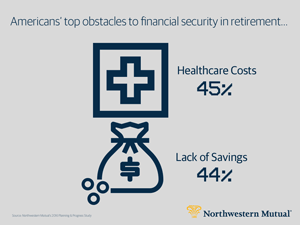
More bullish about themselves than the U.S.
Despite the financial challenges they’re facing, Americans are generally positive about their broader financial prospects with nearly half (46%) expecting improvement in their finances in 2016. This optimism, however, does not extend to the overall economy. The number of Americans who believe the US economy will be better this year dipped to 31% from 37% last year.
Download the 2016 Planning and Progress Study — The Financial States of America
Two-thirds (66%) of U.S. adults believe that they can attain ‘The American Dream’ and only 16% feel it is out of reach. That said, the study also revealed some interesting nuances about how perceptions of The American Dream have changed, and not just generation over generation. A third (31%) of Americans say their definition of The American Dream has changed in just the last five years; and more than half (57%) say their view of The American Dream is different than how their parents viewed it.
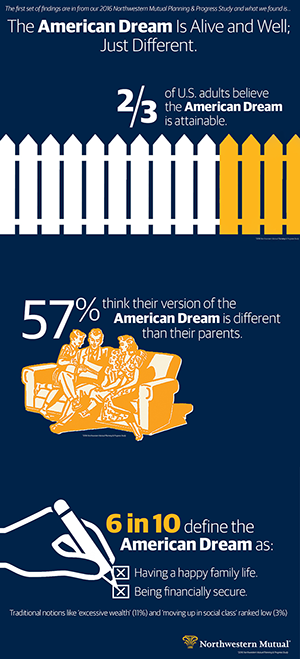
In today’s view of The American Dream, happiness and security are valued considerably more than wealth, opportunity and moving up in social class. When asked about the most defining characteristics of The American Dream today, the top two answers were:
- “Having a happy family life” (59%); and
- “Being financially secure” (58%)
This far outweighed some of the more traditional notions of The American Dream, including:
- “Having more opportunities than my parents’ generation” (18%);
- “Having wealth/making a lot of money” (11%); and
- “Moving up in social class” (3%)
Interestingly, a full three-quarters of Americans (74%) say they would not swap the lifestyle and financial situation they have today for what their parents had when they were the same age.
Financial Insecurity
While long-term optimism in the attainability of The American Dream is positive, there is also considerable evidence showing that many people do not feel financially secure in the present, and are not bringing high levels of discipline to their financial planning. The study found:
- Nearly a third of US adults (29%) said they do not feel financially secure;
- Only one in five (21%) Americans consider themselves to be “highly disciplined” financial planners;
- A third (34%) consider themselves “disciplined” planners;
- Another third (33%) consider themselves “informal”; and
- More than one in ten (12%) “do not plan at all” and “have not set any financial goals”
Download the 2016 Planning and Progress Study - The American Dream
